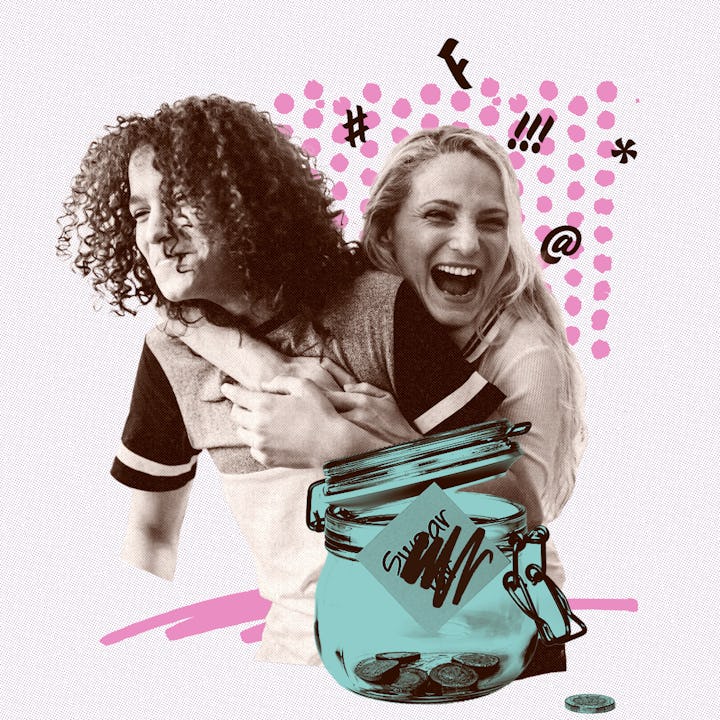The Best Thing About Your Kids Getting Older Is The Ability To Swear Freely (Obviously)
Cursing, in all its nuances and contours, is sublime.

My son was four years old when he said his first curse word. Strapped in the back seat of the family sedan, he asked what was wrong after I groaned audibly in frustration over missing a green light en route to an important appointment. We are going to be late, and mommy has big feelings, I explained.
“Oh,” he said, then chewed on a goldfish cracker before delivering with perfect inflection, “Fuck.”
In the blur of memories of his preschooler years, this one is permanently seared in the hippocampus as the moment I felt like an abject failure. The good mom image that lived in my head did not use that kind of language, so I surgically removed taboo words from my vocabulary and replaced them with watered-down descriptions of my inner turmoil every time I stubbed my toe (Ouch, the pain is shooting through my foot!) or forgot an important task (Whoa! I totally forgot to defrost the chicken for dinner… boo).
The shift was intentional, but felt disingenuous — like I was using an ellipse to punctuate my exclamations instead of a much needed “!!”
For a while, I noticed my son also narrated his big feelings like a sanitized sport play caller when unexpected tragedies like the collapse of a meticulously built Magna-Tiles structure befell. His hazel eyes would flash with anger, warning of the ensuing wave of emotions, then with tiny, clenched fists, he would smash the remains of the structure with guttural cries, “Oopsie Poopsie! It broke!”
It was like living with a tiny Ned Flanders of my own making.
Since my son crossed the threshold into becoming a tween, he has checked all the developmental boxes of entering a transitional age: more reticence when words used to be free-flowing and more need for physical space when I used to peel him away from playing underfoot. Sometimes during our one-on-one time, I quickly find the closed door of conversations that used to be boundless.
In our shifting relationship, when we find ourselves on uncharted terrain of not knowing how to communicate, the common ground is the occasional well-placed curse word. It is our lingua franca.
“It’s so fucking hard,” he says one day while lying face down on the bedroom floor that has seen his meltdowns since toddlerhood until this day when his 10-year-old body is almost as tall as mine. He is talking about the pressure of school or maybe his hot-and-cold sibling relationship, or likely everything that is making his inside feel so terrible. And the only way to describe it is just as he had. He peers out from behind his arm to gauge my reaction, like he is asking himself, “Am I in trouble?”
And I, with all the loving presence of a mom freed from euphemisms, say, “Yes, I am so sorry it is so fucking hard.”
Cursing, in all its nuances and contours, is sublime. When appropriately applied, it can be cathartic, and scientifically good for you, at least according to a study by psychologist Richard Stephens of Keele University. The study found that students who could use expletives while submerging their hands in ice cold water could tolerate pain for longer than the students who could only say “shoot” or “oopsie poopsie.”
By swearing, we can increase our resilience and agency in unexpected life moments when things fall apart. But let’s be honest, it’s not exactly socially acceptable for a kid to say “fuck.” Remember what happened to Ralphie in “A Christmas Story” when he dropped an appropriate F-bomb, “the queen mother of dirty words,” while trying to help his dad change a flat tire in the dark? I’ve lived in fear of having to eat soap for so long I still find it difficult to curse in front of my parents.
With my tween son, I want our communication to be honest and unfettered with social pretenses. I tell him that there is no such thing as a “bad” word. We talk about the meaning, origins and usages of words that would likely make great-grandparents turn over in their graves. And in those moments, his closed doors open again in a free flow of conversation that meets the moment. He is no longer the preschooler in the backseat who can be assuaged with cute euphemisms.
And by embracing curse words as honest expressions that emphasize the importance of what we are feeling, I acknowledge his humanity, completely uncensored. Then he is free to meet mine in the same way.
One day, bowed by the pressure of parenting in a never-ending pandemic, he found me crying in the kitchen.
“I am having a shitty day,” I said, emphasizing every consonant.
“Oh,” he replied, stepping closer. “That’s so fucking hard.”
And I’ve never felt so seen.
Lynda Lin Grigsby is a journalist, wife, mom, and athlete. She writes about the intersections between race, identity and parenting. Find her bylines at Parents, Pasadena Magazine and Pacific Citizen.